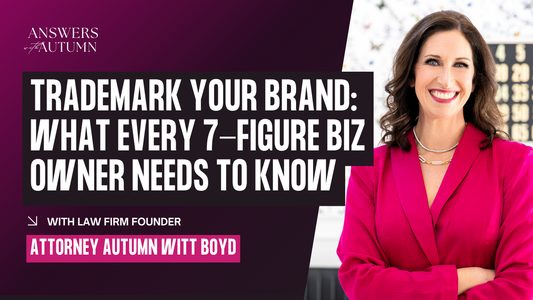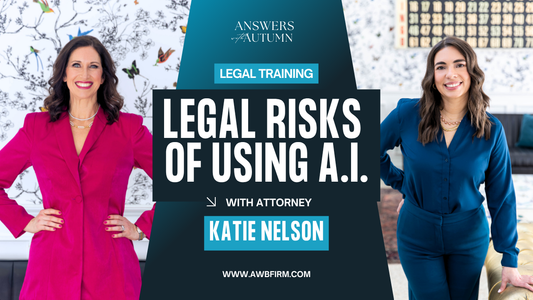Why Trademark Protection Matters for Online Coaches, Course Creators, and CEOs
If you're running a high-revenue coaching, consulting, or digital product business, your brand is one of your most valuable assets. And without the right legal protection in place, it's at constant risk from lookalike competitors, confusion in the marketplace, and lost revenue.
That’s where trademark protection comes in.
In this guide, you'll learn exactly what trademarks are, why they matter for online entrepreneurs, and how to legally protect your brand across platforms and state lines.
Watch the Full Legal Training Session
What Is a Trademark and Why Does It Matter?
A trademark legally protects the words, phrases, symbols, or designs that identify your products or services. For online businesses, that might include:
- Your business or brand name
- The title of your online course, podcast, or membership
- A signature framework or proprietary process
- Your logo or visual branding
- A tagline, slogan, or product line
The purpose of a trademark is to prevent confusion in the marketplace and help customers find your business not a competitor with a similar name or offering.
Common Law vs. Registered Trademarks: What's the Difference?
In the United States, you automatically get some rights to a trademark just by using it in commerce. These are called common law trademark rights, and they apply in the geographic area where you're doing business.
But those rights are limited. You can’t enforce them across all 50 states. And platforms like Instagram, Amazon, and YouTube won’t recognize them when you need to take down a copycat account or listing.
If you want full, nationwide protection, you'll need to apply for a federal trademark registration through the U.S. Patent and Trademark Office (USPTO). With a registered trademark, you’ll have stronger legal tools and broader reach which is especially important for businesses operating online.
7 Reasons Online Business Owners Should Register Their Trademarks
-
Nationwide Protection
Your rights aren’t confined to one state. A federal registration gives you the legal power to protect your brand in every state, no matter where your customers are.
-
Platform Enforcement
Social media platforms and marketplaces like Amazon require a registered trademark before allowing takedowns or enrolling in brand protection programs.
-
Search Visibility
When someone researches a new brand name or course title in the USPTO database, yours will show up making it less likely they’ll accidentally (or intentionally) choose something too similar.
-
Legal Leverage in Court
Registered trademarks come with legal presumptions that make enforcing your rights faster and easier if a dispute escalates.
-
International Expansion
If you serve clients globally or want to expand overseas, you can build on your U.S. registration through systems like the Madrid Protocol.
-
Stronger Business Valuation
Trademarks are intellectual property assets that increase the value of your business, especially if you plan to raise capital or sell one day.
-
Easier, Cheaper Enforcement
With a registration in place, you can often stop infringers without going to court simply by submitting a report or sending a cease-and-desist letter.
What Can You Trademark in Your Online Business?
You can register a trademark for more than just your business name. Consider protecting:
- Your course or membership name
- Your podcast title
- A proprietary framework or methodology
- Your logo, especially if it's used on client gifts, merch, or promotional materials
- Taglines, slogans, or brand phrases associated with your services
You can even register a distinctive color or sound if it’s strongly associated with your brand (think Tiffany Blue or the NBC chime).
How Long Does the Trademark Process Take?
From start to finish, trademark registration can take 12 to 18 months, even if everything goes smoothly. The USPTO reviews every application manually, and there are often delays or bumps in the road.
Common slowdowns include:
- Office actions from the USPTO requesting clarification or rejecting your application
- Opposition periods, where another party claims your mark is too similar to theirs
- Backlogs due to high application volume
Because of this, it’s smart to file your application as soon as possible and ideally before launching a new brand or product.
How to Handle Trademark Infringement
A trademark registration is only useful if you enforce it. If you see someone using a name or logo that's too close to yours, take action.
Start by documenting everything (screenshots, dates, URLs). Then talk to your attorney about options. Depending on the situation, you may:
- Reach out casually to resolve things behind the scenes
- Send a formal cease-and-desist letter
- File a takedown report with the platform involved
- Initiate legal action if needed
At The AWB Firm, we often help clients resolve trademark disputes quickly and strategically without going to court.
When Should You Register Your Trademark?
If you're investing in your brand (through a podcast, a course, paid ads, or social content) it's time. Waiting until you "get bigger" is risky. The longer you delay, the more likely someone else will beat you to registration or create confusion in the market.
You don’t need to register every brand asset right away, but your most visible names and logos should be protected as soon as possible.
Don't Wait to Protect Your Brand
At The AWB Firm, we’ve helped hundreds of high-revenue founders build rock-solid legal foundations for their businesses. Our success rate for trademark registrations is over 95%, and we can help you strategically protect your brand assets with confidence.
Learn more about our process and how we can work together.
Disclaimer: Based on US law. This information is attorney advertising and does not establish an attorney-client relationship.
Topics: Answer with Autumn, Intellectual Property, Trademarks


